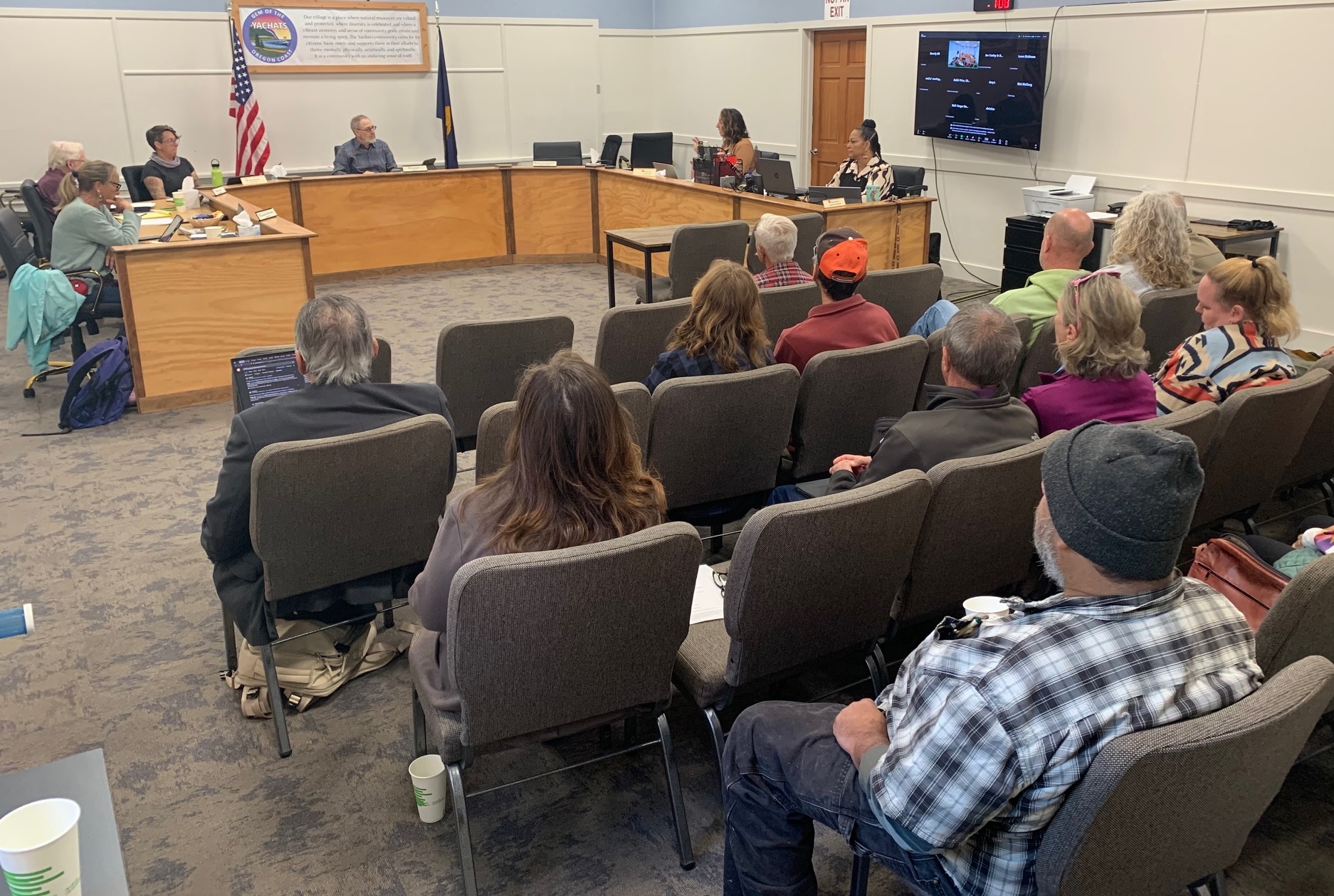
By GARRET JAROS / Lincoln Chronicle
YACHATS – A Yachats city council hearing Wednesday to clarify vacation rental policies heard from license holders who favor one specific change — to be able to pass licenses on to family members. That’s something the current policy does not allow.
And it is not a new argument.
“I have not heard anything new with this testimony that we didn’t hear when we enacted this,” Mayor Craig Berdie said after public comments finished. “These are the exact same questions and concerns that came up when the ordinance was enacted originally in 2017.”
When it was first discussed, the same question came up and the decision to not allow licenses to be passed on to buyers of property or to family members was based on feedback from “a broad swath” of the community, Berdie said, not just the people who own licenses.
“This was debated for a year-and-a-half and in the end the city council said, ‘No, we want only one person, one family to have it and it doesn’t pass down’,” Berdie said. “That was the decision.”
A vacation rental license is an asset owned by the city, which has capped the number at 125. When a license is forfeited, it goes back into a pool where people on a waiting list are then given an opportunity to get one. There are six people currently on that list.
The biggest changes in the proposed ordinance update are clarifications, city manager Bobbi Price said before the public comments Wednesday. There was an addition to better define who can hold the license, which aligns with the original intention of the code as well as longstanding city policy and administration of the licenses.
“It’s really just making it much clearer,” Price said.
The definition states the holder of the license must be a person or two, who own the property and are on the deed. A trust or a business cannot own the license. That doesn’t mean a corporation or trust cannot own the property, only that the owners hold the rental license and that the license ends when they die or sell.
Also clarified in the proposed ordinance was a recent change to water rates for vacation rentals. They are now charged the commercial water rate, which is 25 percent higher than the residential base rate with no included units of water. Residential homes receive two included units before being charged for use.
There is also an extension – from five to 20 days — for fixing repairs after inspection, which happen once every two years. Another addition is that vacation rentals owners must collect rent within a two-year period or the license expires.
“Which we just did this year.” Berdie said. “… There were a number of people who had not ever collected revenue on their licenses and decided to give it up. And now we are just mandating that – that you have to collect revenue or the license goes to somebody else.”
The city made that change after the city’s finance committee uncovered how much lodging tax revenue was being lost due to vacation licenses sitting idle for years.
It was also determined at the last council meeting that while licenses can be issued for duplexes and triplexes, they cannot for additional dwelling units.

Public comment
Michelle Korgan, who owns ONA Restaurant & Lounge in Yachats and operates the Heceta Head Lighthouse Bed & Breakfast, said her family would lose the beach house purchased by her parents if the license, which is now solely in her 85-year-old mother’s name, cannot be passed to family.

“In the proposed ordinance, as it is written, it would be impossible for families like ours to hold on to this home,” Korgan said. “To rent the house, which is 1,000 square feet, and maintain all of the mortgage and taxes and upkeep, it would not be sustainable to rent it month-to-month.”
The house would either need to be sold or sit empty, she concluded.
Another speaker added that having their house as a vacation rental also allows the family to enjoy it when it’s not being rented, which is not possible if it were a long-term rental.
Jamie Michel of Waldport, representing Via Oregon, a coalition of home and small business owners and vacation rental advocates, said they were “deeply concerned about language that limits licensing only to an actual person.”
She questioned the legality based on the Supreme Court’s 2010 Citizen United decision that says corporations and limited liability companies are recognized as people under the law who “have the same right to own property and exercise ownership, (and) related privileges as any individual person.”
Councilor Barry Collins later said he did not believe Michel’s reading of the law would hold up to scrutiny. Berdie added that the city’s attorney was likely well aware of the law when helping craft the ordinance’s language, but directed the city manager to revisit the topic.
The Lincoln Chronicle found that when identifying Citizens United for the basis of corporate identity, the court was referring specifically to rights associated with the First Amendment and the application of federal campaign finance rules.
As far as a corporation designated as a beneficiary in a will, corporations can be designated heirs of stocks and other real property, which is common with nonprofits. The issue likely more clearly pertains to the legal ownership of the licenses, which in this case belong to the city.
Another license holder, who lives in Washington, told the council their vacation rental income pays the bills but does not generate a profit. If the license, which is in his name, went back to the city after he dies, his children — although they would be able to apply for a new license — would likely not be able to support it in the interim.
Councilors asked Price to look at how other coastal cities handle vacation rental license transfers and the relevance of the Citizens United court ruling and instructed her how to fine-tune some of the language. She will bring another draft back to council for a second public hearing and possible approval in December.
The council also instructed her to reach out with a survey to gauge broader public opinion about whether a license should be able to be passed on generationally, which Berdie pointed out, would greatly limit new people from getting licenses.
When this was heard initially, Berdie said, there were people with the same vested interests who were making the same arguments to be able to pass the license on themselves, but more in the community who opposed it.
After the close of the meeting, the mayor said to councilors “We’re re-litigating something that had been contentiously decided.”
Reservoir search
In other business the council:
- Approved moving forward with investigating a new water tank location on the property where the city’s water plant is located. The cost to do preliminary survey work, road grading and geotechnical testing is estimated at $100,000. The city has not heard back from Layne Morrill, the owner of the previously explored Fisterra site, whether he would grant the city an extension to possibly use that site to locate a tank while it looks at the feasibility of the new site. Engineers determined the Fisterra property, located on the steep slopes above Sea Aire Assisted Living, could be used but that it would be technically difficult and very expensive.
- Heard that the city’s September appeal of the Oregon Department of Transportation’s speed study will result in ODOT extending the 25 mph zone on the north end of town farther north past the Dollar General store and The Village Bean, and lower the 40 mph zones on the both the north and south ends of town to 35 mph.
- Garret Jaros covers the communities of Yachats, Waldport, south Lincoln County and natural resources issues and can be reached at GJaros@YachatsNews.com





















A much better option than these licenses would be issuing yearly permits similar to how Taxi’s operate.
You can still cap your Permits at 125 and charge $5,000 for them and the city would raise 625,000/year. Each Permit holder would need to show proof of Insurance and be treated like the businesses they are.
If you don’t want to pay the $5,000 permit cost than the city gains a new property for long-term rentals or home-owners which solves a much bigger need than catering to tourists.
Might a family member of an elderly short term rental license holder who desires effective continuation after the death of the licensee apply proactively to get on the list? Then, when they eventually receive an offer from the city to accept a short-term rental license, they can do so, provided the elderly licensee voluntarily relinquishes his or her license to the city. (This would leave the city with the same number of licenses; it would not increase that number at any time because the license applicant family member would be waiting on the city’s backlog of licenses to clear, NOT on the current licensee’s death before getting their offer from the city). Careful planning by the family would be required, including amending or transferring the home’s title to the new license holder prior to applying for a new license. It might be desirable for the city to limit this practice to immediate family members like a spouse and/or children of the current license holder: We don’t want homes of the elderly going up for sale with an expectation by the buyer that the home will (automatically) continue to be a short-term vacation rental.
It’s not fair to the people that have applied and have been waiting. The entire idea that someone can tell you what you can or can’t do with your property is wrong to begin with. If there is going to remain a cap, you should only be able to have it for a set amount of time as it keeps the people that bought their home specifically for the purpose of using it for a vacation rental and their personal use.
Short term rentals (STR), of which we hold a license, provides a much needed revenue to the city beyond the normal taxing methods. This is to the advantage of local residents and businesses. Each year, as an owner of a STR we pay a licensing fee, each quarter we pay the STR taxes, sometime amounting to over $1,000 and recently we are paying a commercial rate for our water/sewer system.
Now that the city is recognizing this as a profitable income, perhaps there are some steps to refine it. 1) zone the ocean/water front homes as a STR Zone area and give preference for the licenses and the licenses transferable. This action would reduce the amount of STR inside the residential area.
2) Since the city is recognizing this as a special business and income source, recognize many of us, like myself, have little say in Yachats government.
3) I agree the folks who hold licenses and don’t use their homes as STR or fail to report income in a two year period should lose their licenses.
Finally, I want to say in the 20 years we have owned our property here that we love Yachats, but need to live somewhere else. We do get to visit our home here about once a month for a long weekend. We are constantly investing in our property to improve it and maintain it. The income from it covers the city taxes, the county taxes, state and federal income taxes and some of the maintenance. We are providing income to our on-site manager, the local repair folks, and during our stay we support local restaurants and stores.
In one way I love and think of Yachats as a “Le De Da” persona, and in another way when it comes to STR, it doesn’t carry that theme. There is no reason, I can think of, that the STR licenses can’t be transferrable.
No the license should not be able to be passed down or transferred. The family can absolutely keep the house and A) live in it B) use it as a vacation property for their family and friends C) reapply for a vacation rental license in the meantime. Personally I’d rather see homes around here used as a home to live in and not as an instrument to make money. I am fine with a property like this being sold and hopefully used to provide shelter rather than a short term rental.